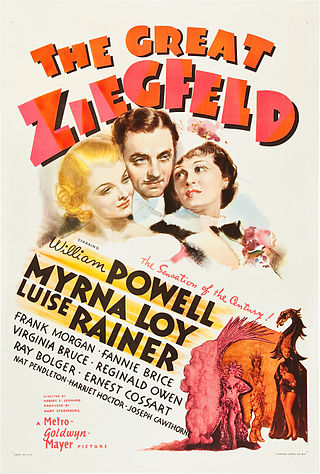
The Great Ziegfeld is a 1936 American musical drama film directed by Robert Z. Leonard and produced by Hunt Stromberg. It stars William Powell as the theatrical impresario Florenz "Flo" Ziegfeld Jr., Luise Rainer as Anna Held, and Myrna Loy as Billie Burke.
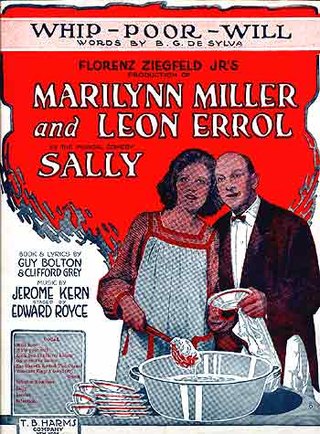
Sally is a musical comedy with music by Jerome Kern, lyrics by Clifford Grey and book by Guy Bolton, with additional lyrics by Buddy De Sylva, Anne Caldwell and P. G. Wodehouse. The plot hinges on a mistaken identity: Sally, a waif, is a dishwasher at the Alley Inn in New York City. She poses as a famous foreign ballerina and rises to fame through joining the Ziegfeld Follies. There is a rags to riches story, a ballet as a centrepiece, and a wedding as a finale. "Look for the Silver Lining" continues to be one of Kern's most familiar songs. The song is lampooned by another song, "Look for a Sky of Blue," in Rick Besoyan's satirical 1959 musical Little Mary Sunshine.

That's Entertainment! is a 1974 American compilation film released by Metro-Goldwyn-Mayer to celebrate the studio's 50th anniversary. The success of the retrospective prompted a 1976 sequel, the related 1985 film That's Dancing!, and a third installment in 1994.

June Haver was an American film actress, singer and dancer. Once groomed by 20th Century Fox to be "the next Betty Grable," Haver appeared in a string of musicals, but she never achieved Grable's popularity. Haver's second husband was the actor Fred MacMurray, whom she married after she retired from showbusiness.
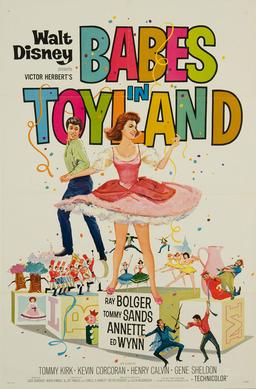
Babes in Toyland is a 1961 American Christmas musical film directed by Jack Donohue and produced by Walt Disney Productions. It stars Ray Bolger as Barnaby, Tommy Sands as Tom Piper, Annette Funicello as Mary Contrary, and Ed Wynn as the Toymaker.

"Carolina in the Morning" is a popular song with words by Gus Kahn and music by Walter Donaldson, first published in 1922 by Jerome H. Remick & Co.
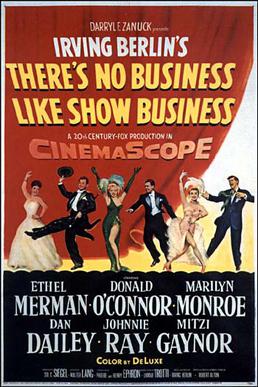
Irving Berlin's There's No Business Like Show Business is a 1954 American musical comedy-drama film directed by Walter Lang. It stars an ensemble cast, consisting of Ethel Merman, Donald O'Connor, Marilyn Monroe, Dan Dailey, Johnnie Ray, and Mitzi Gaynor.
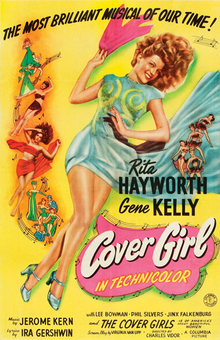
Cover Girl is a 1944 American musical romantic comedy film directed by Charles Vidor, and starring Rita Hayworth and Gene Kelly. The film tells the story of a chorus girl given a chance at stardom when she is offered an opportunity to be a highly paid cover girl. It was one of the most popular musicals of the war years.

Marilyn Miller was one of the most popular Broadway musical stars of the 1920s and early 1930s. She was an accomplished tap dancer, singer and actress, and the combination of these talents endeared her to audiences. On stage, she usually played rags-to-riches Cinderella characters who lived happily ever after. Her enormous popularity and famed image were in distinct contrast to her personal life, which was marred by disappointment, tragedy, frequent illness, and ultimately her sudden death due to complications of nasal surgery at age 37.
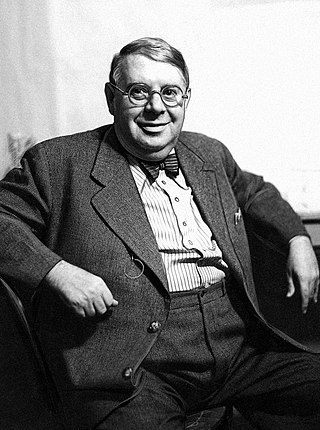
Szőke Szakáll, known in the English-speaking world as S. Z. Sakall, was a Hungarian-American stage and film character actor. He appeared in many films, including Casablanca (1942), in which he played Carl, the head waiter; Christmas in Connecticut (1945); In the Good Old Summertime (1949); and Lullaby of Broadway (1951). Sakall played numerous supporting roles in Hollywood musicals and comedies in the 1940s and 1950s. His rotund cuteness caused studio head Jack Warner to bestow on Sakall the nickname "Cuddles".

Till The Clouds Roll By is a 1946 American Technicolor musical film produced by Metro-Goldwyn-Mayer and a fictionalized biopic of composer Jerome Kern, portrayed by Robert Walker. Kern was involved with the production, but died before its completion. It was the first in a series of MGM biopics about Broadway composers.
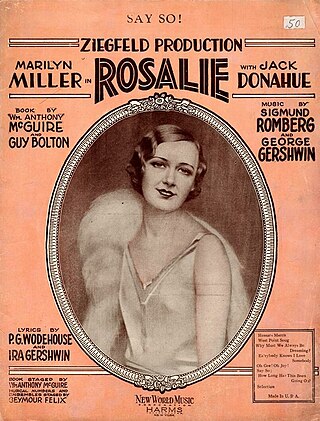
Rosalie is a musical with music by George Gershwin and Sigmund Romberg, lyrics by Ira Gershwin and P.G. Wodehouse, and book by William Anthony McGuire and Guy Bolton. The story tells of a princess from a faraway land who comes to America and falls in love with a West Point Lieutenant.

Sally is a 1929 American Pre-Code film. It is the fourth all-sound, all-color feature film made, and it was photographed in the Technicolor process. It was the sixth feature film to contain color that had been released by Warner Bros.; the first five were The Desert Song (1929), On with the Show! (1929), Gold Diggers of Broadway (1929), Paris (1929) and The Show of Shows (1929).. Although exhibited in a few theaters in December 1929, Sally entered general release on January 12, 1930.

Sunny is a 1930 American pre-Code musical comedy film directed by William A. Seiter and starring Lawrence Gray, O. P. Heggie, and Inez Courtney. It was produced and released by First National Pictures. The film was based on the Broadway stage hit, Sunny, produced by Charles Dillingham, which played from September 22, 1925, to December 11, 1926. Marilyn Miller, who had played the leading part in the Broadway production, was hired by Warner Brothers to reprise the role that made her the highest-paid star on Broadway.

Palm Springs Weekend is a 1963 Warner Bros. bedroom comedy film directed by Norman Taurog. It has elements of the beach party genre and has been called "a sort of Westernized version of Where the Boys Are" by Billboard magazine. It stars Troy Donahue, Stefanie Powers, Robert Conrad, Ty Hardin, and Connie Stevens.
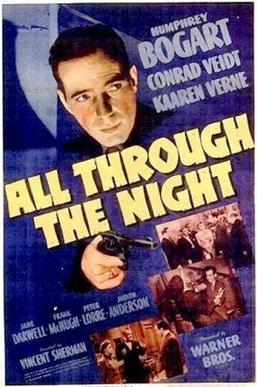
All Through the Night is a 1942 American comedy-crime-spy thriller film directed by Vincent Sherman and starring Humphrey Bogart, Conrad Veidt and Kaaren Verne, and featuring many of the Warner Bros. company of character actors. It was released by Warner Brothers. The supporting cast features Peter Lorre, Frank McHugh, Jackie Gleason, Phil Silvers, Barton MacLane, and William Demarest.
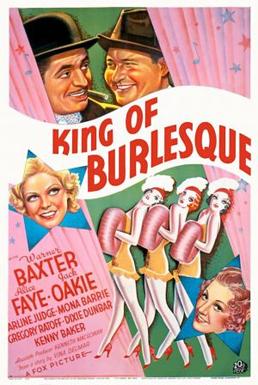
King of Burlesque is a 1936 American musical film directed by Sidney Lanfield and starring Warner Baxter, Alice Faye and Jack Oakie. It is about a former burlesque producer played by Baxter who moves into a legitimate theatre and does very well, until he marries a socialite. Sammy Lee received an Academy Award nomination for the now dead category of Best Dance Direction at the 8th Academy Awards. Today the film is best known for Fats Waller's rendition of "I've Got My Fingers Crossed".

The Girl Next Door is a 1953 American musical comedy film directed by Richard Sale and starring June Haver, Dan Dailey, and Dennis Day. It was made and released by 20th Century Fox.
John Francis Donohue was an American film actor, screenwriter, director, producer, composer, and choreographer.
John Donahue was an American dancer and comedian in vaudeville and films.


















